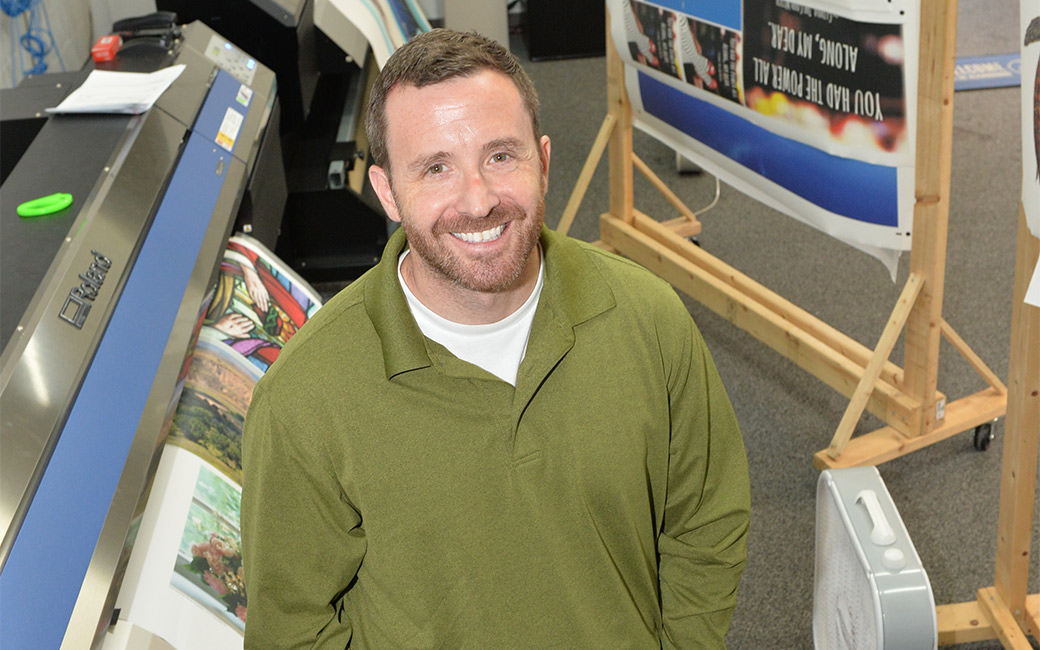Jason Weisenthal
Alumnus: Business Administration '95

Thomas Edison is credited for coining the phrase "genius is one percent inspiration and 99 percent perspiration," an apt expression for new business endeavors. But for entrepreneurs like Jason Weisenthal BUAD '95, there's a good bit of competitive spirit in the equation as well.
The New Jersey native was already a self-made and experienced business owner when he came up with the concept for his current e-commerce venture, WallMonkeys.com. The owner of a children's shoe store in Elizabeth, N.J., Weisenthal was perusing websites selling life-sized, stickable wall decals of athletes to sports fans when inspiration struck.
“ I wasn't going to sit back and watch other people be successful, so I worked alongside others who motivated me. ”
If this e-commerce venture could be successful, he asked himself, why couldn't a company offer customers the opportunity to create their own custom wall decals with personal photos?
Thrilled by his idea to enter this untapped market and undaunted by the risk, Weisenthal invested in the large-format printers and web technologies needed to start his venture. But about a year into the business, things weren't going so smoothly. Products were coming out inconsistently.
"The quality of photos submitted by customers just wasn't there," explains Weisenthal.
So to supplement the custom decal products, WallMonkeys introduced other decals of images like street signs, window scenes and cartoon animals.
"As soon as those products started to sell increasingly more, I took a pause," Weisenthal says. "I approached Fotolia, one of the world's largest stock image companies, and negotiated a pay-per-print licensing deal. That was the light bulb moment."
Weisenthal arranged similar deals with stock image providers like National Geographic, Getty Images and more. Today, WallMonkeys offers its customers a library of more than 20 million images for printing.
"I find it funny that I don't know much about art, but I sure sell a whole lot of it," Weisenthal admits.
He says he has no qualm with WallMonkeys straying from the path of his original vision.
"I kept trying different angles and it didn't work. When you find the right angle you have to pursue that to be successful. I found a niche and now the game is taking advantage of it."
And although Weisenthal got his entrepreneurial feet wet in retail sales, he has little nostalgia for it from a business perspective.
"The advantages of e-commerce over retail are staggering," he says. "There's little overhead, there's no lost sales because of things like weather. In retail all your customers have to come through your door, but the possibilities are endless with e-commerce."
While part of the entrepreneurial game is making choices and sticking to them, half of the game is good old hard work, Weisenthal says. He credits his strong work ethic to his academic and extracurricular experiences at Towson, especially the friends and role models found in his fraternity, Sigma Alpha Epsilon.
"I wasn't going to sit back and watch other people be successful, so I worked alongside others who motivated me."
In addition to staying close with those friends now, Weisenthal continues to surround himself with others who motivate him. He's an active member of cadre D.C.—an organization that bills itself as a new approach to networking with an emphasis on building relationships, not just shaking hands.
Driven by more than just the success of his own endeavors, Weisenthal sees building networks as a way to benefit the greater community.
"There's nothing I'm more passionate about than small business," he says.
Weisenthal's appetite for entrepreneurial risk took an interesting turn this spring. Looking to get more involved with his alma mater, Weisenthal got in touch with the CBE and heard about the college's Associate competition. Inspired by the innovative program, Weisenthal decided to present a case. He asked the two finalists to come up with a new product line for WallMonkeys with the caveat that whichever idea won, WallMonkeys would implement that new product with $50,000 in cash to back it up.
The competition's two finalists recommended everything from customer dry-erase decals to decals for cars. But it was Thomas Slemp's recommendation to bundle decals together as packages that peaked Weisenthal's attention the most.
He says he plans to roll out the packages in the next year or so as his business continues to expand.
When his now four-year-old business started turning a profit after just two years, one could say Weisenthal had won the game, but if you ask him the first round isn't near over.
"We're testing new materials and setting up new sales channels," he says. "You could say we're in a growth phase now, but I still feel like we're at the beginning."